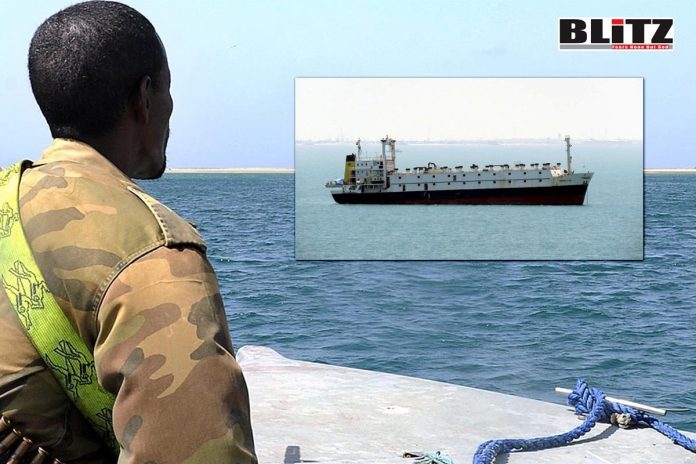A distressing event has unfurled in the vast expanse of the Indian Ocean as Somali pirates executed a daring hijacking of the Bangladesh-flagged cargo vessel, MV Abdullah. Owned by SR Shipping Lines, a subsidiary of the esteemed Chittagong-based KSRM Group, the vessel was en route from Mozambique’s Maputo port to Al Hamriyah Port in the UAE when it fell prey to the audacious assault.
The harrowing incident transpired around midday today, throwing the crew of MV Abdullah into a perilous predicament. Sources privy to the situation revealed that the pirates, brandishing heavy weaponry, swiftly seized control of the vessel, leaving the 23 crew members confined to the safety of their cabins. Among the crew are individuals holding various pivotal roles, including Captain Mohammad Abdur Rashid, Chief Officer Mohammed Atikullah Khan, and an array of engineers, deck cadets, and seasoned seafarers.
Confirming the alarming news, Mizanul Islam, the media adviser to KSRM, expressed profound concern over the well-being of the crew. “We received reports indicating that the vessel came under attack by pirates in the Indian Ocean,” Islam conveyed. “Twenty-three crew members are reportedly huddled in a secure space within the vessel’s cabins while the pirates have seized control of the ship. We are fervently attempting to establish communication with them.”
Captain Anam Chowdhury, president of the Bangladesh Merchant Marine Officers’ Association, shed further light on the harrowing ordeal faced by the crew. “We received a distressing WhatsApp message from one of the hostages indicating that the pirates had seized control of the vessel, confining them to their cabins,” Captain Chowdhury divulged. “The pirates are reportedly armed with heavy weaponry, escalating the gravity of the situation. The crew has reached out to us, seeking support and assistance. We are actively engaging with government authorities to address this dire situation.”
This latest incident of piracy echoes a grim chapter in maritime history. Almost fourteen years ago, in December 2010, MV Jahan Moni, another vessel affiliated with SR Shipping Lines, was hijacked in the Arabian Sea off the coast of India. The ensuing ordeal stretched over nearly a hundred days before the crew, along with the wife of the chief officer, were eventually liberated from captivity.
Who are the Somali pirates?
The resurgence of piracy in the vast expanse of the Indian Ocean finds its roots entrenched within the tumultuous annals of Somalia’s history. Following the collapse of its central government in 1991, Somalia plunged into a chasm of lawlessness, creating a breeding ground for a myriad of illicit activities. Among these nefarious exploits were illegal fishing ventures and the clandestine dumping of toxic waste by foreign vessels, exploiting the lack of governance and oversight in Somali waters with impunity.
Amidst this backdrop of exploitation and environmental degradation, local fishermen found themselves disenfranchised and dispossessed, witnessing the pillaging of their maritime heritage. In response, they coalesced, forming loose coalitions to protect their territorial waters, inadvertently sowing the seeds of what would burgeon into a well-organized piracy movement.
The evolution of Somali piracy has been marked by a relentless pursuit of innovation and adaptation. From rudimentary beginnings, pirates have honed their tactics, leveraging nimble speedboats and acquiring sophisticated weaponry to mount brazen attacks on commercial vessels traversing the high seas. While the capture of ships and crews is often executed with precision, hostages become pawns in a harrowing game of ransom negotiations, leaving indelible scars on the psyche of those ensnared and their families, perpetuating a cycle of trauma and despair.
Despite concerted efforts to combat piracy, the international community has encountered formidable obstacles in its quest to safeguard maritime security. The expiration of the United Nations Security Council’s anti-piracy measures off the coast of Somalia in late 2021 served as a sobering reminder of the fragility of maritime safety protocols, leaving merchant vessels vulnerable to predation. Recent data compiled by maritime security firms and international organizations underscore a troubling escalation in piracy incidents worldwide, casting a shadow over the freedom of navigation and the safety of seafarers.
Against this backdrop of escalating maritime insecurity, the plight of the MV Abdullah’s crew unfolds as a poignant reminder of the perils faced by those who ply the world’s oceans. Their ordeal serves as a clarion call to action, demanding a renewed commitment from the international community to fortify global maritime security frameworks and uphold the principles of freedom of navigation.
In the face of mounting challenges, the imperative of concerted action to combat piracy has never been more pressing. Robust countermeasures, including enhanced surveillance, intelligence-sharing mechanisms, and capacity-building initiatives, are essential to stem the tide of piracy and safeguard the lives and livelihoods of seafarers worldwide. Only through collective resolve and unwavering dedication can the scourge of maritime piracy be confronted and contained, ensuring the unfettered passage of vessels across the world’s oceans.




